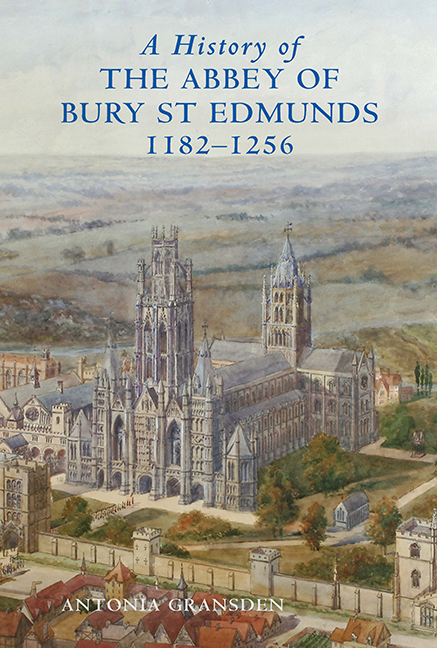Book contents
- Frontmatter
- Dedication
- Contents
- List of plates
- List of figures
- Preface
- Editorial Note
- Epigraph
- Acknowledgements
- Maps and plans (figures 1–9)
- Part I Samson of Tottington, Abbot 1182–1211
- 1 Samson's biographer, Jocelin of Brackland (de Brakelond), and his work
- 2 Samson's early life and career
- 3 Samson's election to the abbacy
- 4 The early years of Samson's abbacy and reform of estate management
- 5 Conflict with the convent
- 6 Relations with the town of Bury St Edmunds
- 7 Samson and secular law
- 8 Samson and the knights of St Edmund
- 9 Relations with the Angevin kings
- 10 Samson and the papacy
- 11 Samson as a builder
- 12 Religious and intellectual life under Samson
- 13 Samson's death and burial
- PART II The Abbey 1212–1256
- APPENDICES
9 - Relations with the Angevin kings
from Part I - Samson of Tottington, Abbot 1182–1211
Published online by Cambridge University Press: 29 April 2017
- Frontmatter
- Dedication
- Contents
- List of plates
- List of figures
- Preface
- Editorial Note
- Epigraph
- Acknowledgements
- Maps and plans (figures 1–9)
- Part I Samson of Tottington, Abbot 1182–1211
- 1 Samson's biographer, Jocelin of Brackland (de Brakelond), and his work
- 2 Samson's early life and career
- 3 Samson's election to the abbacy
- 4 The early years of Samson's abbacy and reform of estate management
- 5 Conflict with the convent
- 6 Relations with the town of Bury St Edmunds
- 7 Samson and secular law
- 8 Samson and the knights of St Edmund
- 9 Relations with the Angevin kings
- 10 Samson and the papacy
- 11 Samson as a builder
- 12 Religious and intellectual life under Samson
- 13 Samson's death and burial
- PART II The Abbey 1212–1256
- APPENDICES
Summary
Samson's successful defence of his right as a tenant-in-chief of the crown to the wardship of the infant heiress of one of his military tenants was described above. Similarly, he was constantly on his guard against encroachment by the Angevin kings on St Edmunds’ liberties and possessions. When necessary, he acted quickly to protect them. For example, in 1186 or 1187 the royal justices in eyre fined the counties of Norfolk and Suffolk for ‘a certain offence’ committed within their boundaries: Norfolk was to pay 50 marks and Suffolk 30 marks, and St Edmunds was to pay part of the sum. Samson immediately went with some of his household, including Jocelin of Brackland, to the king at Clarendon. He produced Edward the Confessor's charter which exempted St Edmunds’ lands from all royal taxes and impositions. Henry, therefore, instructed that six knights from Norfolk and six from Suffolk should be summoned to recognize before the barons of the Exchequer whether St Edmunds’ lands were exempt from common amercements. To save labour and expense only six knights were chosen but they were all landholders in both counties. (Jocelin names only three of them.) They went to London with Samson and his party (Jocelin was again among them). They found in the abbot's favour and their verdict was enrolled by the justices.
Samson's disputes in defence of St Edmunds’ rights illustrate the constant interaction of abbatial administration with royal government. Many cases were decided by assize and settled by final concord in the king's court. The enrolment of the settlements ensured permanent, indisputable record. As has been seen, Samson's dispute with the London merchants over toll, the archbishop and monks of Christ Church, Canterbury, over jurisdiction in Monks Eleigh, and with the prior and monks of Ely over Lakenheath market all arose because the parties had incompatible charters: such cases had to be decided in a royal court. Appeal to the king was not usually to him personally but to the justiciar or other regent acting on the king's behalf, since Henry II and John were often, and Richard I was almost always, abroad.
- Type
- Chapter
- Information
- A History of the Abbey of Bury St Edmunds, 1182–1256Samson of Tottington to Edmund of Walpole, pp. 60 - 67Publisher: Boydell & BrewerPrint publication year: 2007

